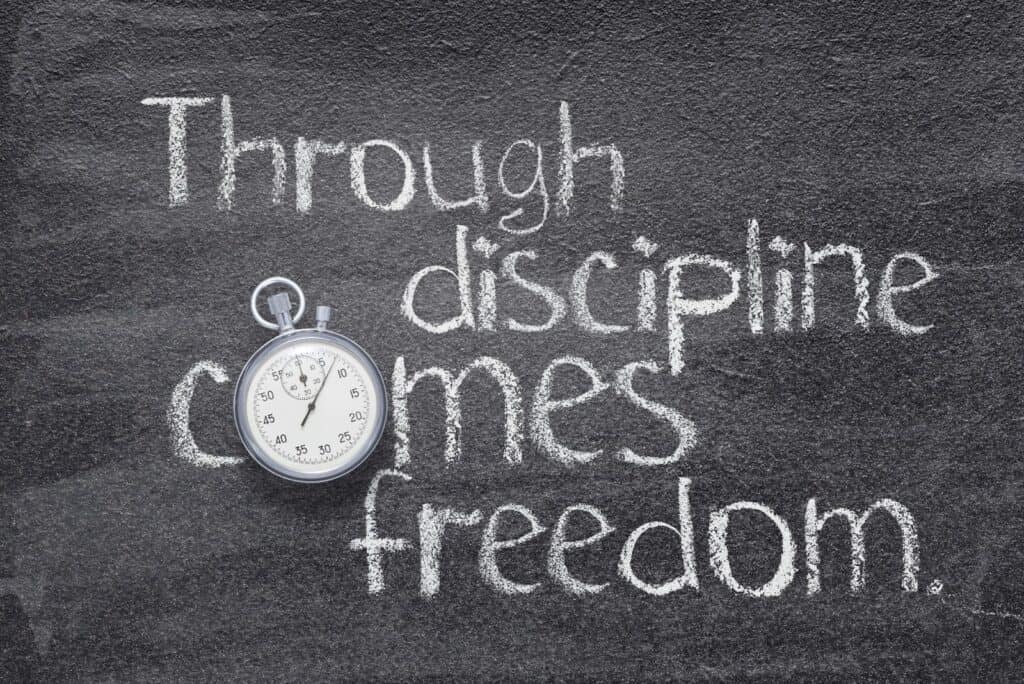
Even the most self-disciplined people sometimes find their strength turning into their Achilles’ heel. It’s a lesser-discussed truth, but it reveals a critical aspect of human behavior. Self-discipline is widely acknowledged for its benefits and importance in personal and professional development. It’s seen as a requisite skill for overcoming challenges like procrastination, laziness, and even complex issues like eating disorders.
People often view self-discipline as the foundation for achieving goals, fostering self-improvement, and paving the path to success. However, what happens when this admired trait starts working against us? When does the power of self-discipline begin to weave a web of unforeseen problems?
This article invites you to explore the facets of self-discipline, unveiling layers to reveal its less-discussed impacts in addition to its importance and benefits.
What is Self-Discipline?
Self-discipline, a personal attribute, is the ability to control one’s feelings and overcome one’s weaknesses; it’s about making decisions and following through with them. The power of self-discipline lies in its capacity to help people act with perseverance and persistence, especially in the face of challenges and problems.
At its core, self-discipline is about self-control and the ability to resist short-term temptations for long-term gains. It’s the skill to cure and overcome obstacles, like procrastination and laziness, which can lead to failure if left unchecked. Self-disciplined people are often seen as more capable of achieving their personal goals, be it overcoming eating disorders, managing better financial decisions, or simply getting up early regardless of laziness.
However, while most people acknowledge its importance, the path to developing self-discipline presents challenges. It’s a personal journey that requires an awareness of one’s undisciplined behavior and a commitment to self-improvement. But it’s not limited to simply being overly self-critical; it’s also understanding the requirements for achieving goals and recognizing the positive outcomes of disciplined actions.
Self-discipline can essentially lead to a stronger character and significant benefits, but like any other skill, it must be balanced and tempered with a holistic understanding of its effects on all aspects of life.
In fact, self-discipline has many benefits, but it also comes with some drawbacks. These are the advantages and disadvantages of self-discipline:
| Advantages of Self-Discipline | Disadvantages of Self-Discipline |
|---|---|
| Streamlines goal achievement | Risks rigid routines |
| Enhances focus on tasks | Can limit spontaneity |
| Reduces procrastination | May invite social isolation |
| Improves time management | Could foster perfectionism |
| Cultivates healthier habits | Risk of self-criticism |
| Bolsters mental resilience | Might neglect relaxation |
| Sharpens decision-making | Can strain relationships |
| Encourages self-reliance | Poses burnout potential |
| Builds enduring confidence | May suppress creativity |
| Fosters consistent performance | |
| Enables better stress control | |
| Cultivates financial prudence | |
| Nurtures self-respect | |
| Expands learning capacity | |
| Strengthens relationships |
-
Identifies clear steps toward goals
-
Breaks larger objectives into manageable tasks
-
Maintains steady progress
-
Prevents burnout
-
Shields against distractions
-
Improves efficiency and quality of work
-
Prioritizes important tasks
-
Fosters a deep engagement with work
-
Encourages immediate task initiation
-
Saves time
-
Alleviates stress and anxiety
-
Transforms a reactive mindset into a proactive one
-
Allocates time effectively between tasks
-
Balances work and leisure
-
Enhances productivity
-
Promotes a fulfilling lifestyle
-
Recognizes and alters detrimental habits
-
Consistently chooses long-term health over short-term pleasure
-
Forms new, beneficial habits through repeated actions
-
Transforms daily routines into healthier lifestyles
-
Develops a strong mindset to face adversities
-
Manages stress effectively
-
Rebounds from setbacks with a positive attitude
-
Encourages thoughtful consideration of options
-
Aligns decisions with long-term goals
-
Avoids impulsive and regrettable choices
-
Makes informed choices for well-being and success
-
Fosters trust in one’s abilities
-
Achieves independence in various aspects of life
-
Tackles problems with confidence
-
Instills a sense of personal responsibility for success
-
Sets and achieves incremental goals
-
Develops a sense of accomplishment
-
Trusts in personal abilities
-
Generates self-assurance rooted in achievements
-
Maintains daily commitment to tasks
-
Upholds personal standards of quality
-
Sees steady improvement in skills
-
Achieves personal growth and professional advancement
-
Prioritizes and tackles tasks efficiently
-
Manages time effectively to prevent task buildup
-
Protects mental health
-
Overcomes impulsive spending habits
-
Sets and adheres to a budget
-
Saves regularly for future needs
-
Invests wisely for long-term financial security
-
Aligns choices with personal values and standards
-
Reflects self-care in daily decisions
-
Reinforces belief in personal principles
-
Fosters a deep sense of self-worth and respect
-
Frees up mental energy for learning
-
Effectively manages time for personal development
-
Commits to continuous skill and knowledge acquisition
-
Finds happiness and satisfaction in learning
-
Builds trust and reliability in relationships
-
Maintains commitments and effective communication
-
Perseveres through relationship challenges
-
Manages emotions and actions responsibly
-
Continuous high-pressure routines leading to exhaustion.
-
Ignoring signs of physical and mental fatigue.
-
Consequences of long-term stress on health and well-being.
-
Strategies to prevent burnout, such as setting realistic goals and incorporating rest.
-
Routines become too structured, leaving little room for change.
-
Difficulty adapting to unexpected events.
-
Stress and frustration when routines are disrupted.
-
Potential to overlook new opportunities due to adherence to routine.
-
Reduced ability to enjoy impromptu activities.
-
Missing out on unexpected opportunities.
-
Life can become predictable and monotonous.
-
Lack of balance between control and freedom.
-
Neglecting social activities in favor of personal goals.
-
Difficulty relating to others who don’t share the same level of discipline.
-
Potential feelings of loneliness and isolation.
-
The importance of maintaining a balance between personal ambitions and social interactions.
-
Unrealistic standards and expectations.
-
Increased stress and anxiety over achieving perfection.
-
Constant self-criticism and dissatisfaction with one’s achievements.
-
The need to recognize and accept imperfection as part of the human experience.
-
Tendency to overanalyze and critique personal failures or shortcomings.
-
Difficulty in accepting and learning from mistakes.
-
Self-criticism leading to reduced self-esteem and confidence.
-
Need to balance self-discipline with self-compassion and understanding.
-
Overlooking the importance of rest and relaxation for overall well-being.
-
Viewing leisure activities as unproductive or a waste of time.
-
Potential for burnout due to lack of proper rest.
-
Importance of scheduling downtime to maintain long-term productivity and health.
-
Neglecting relationships in favor of personal goals and routines.
-
Potential for conflicts due to different priorities and lifestyles.
-
Need to communicate and compromise to balance personal discipline with relationship needs.
-
Importance of valuing and nurturing relationships alongside personal ambitions.
-
Structured routines limit time and space for creative thinking.
-
Potential for rigid thinking patterns that discourage creative problem-solving.
-
The need to allocate time for unstructured, creative activities.
-
Balancing discipline with the freedom to explore and create.
To further explore the pros and cons of self-discipline, let’s take a look at each one in detail.
What are the advantages of being self-disciplined?
Self-discipline is undeniably a key ingredient of success. It can help you achieve any goal, no matter how big or small. Here are some of the benefits associated with being self-disciplined:
Streamlines Goal Achievement
Self-discipline serves as a critical tool in the pursuit of goals, big or small. By fostering a disciplined approach, individuals can clearly outline the steps necessary to achieve their objectives.
This clarity aids in the breakdown of larger goals into manageable tasks, making the journey toward success less daunting. With discipline, one can maintain a steady pace, avoiding the pitfalls of overexertion or burnout.
While self-discipline is key to achieving your goals, understanding the difference between self-discipline and motivation can provide further insight into how we can effectively reach our objectives.
Enhances Focus on Tasks
During an era of constant distractions, maintaining focus is a challenge. Self-discipline acts as a shield against the lure of distractions, enabling individuals to concentrate on the task at hand.
This heightened focus leads to improved efficiency and quality of work, as the mind is wholly devoted to the present activity. Rather than limiting freedom; discipline is more on mastering the art of prioritizing what truly matters.
Reduces Procrastination
Procrastination, often a symptom of a lack of self-control, can be significantly diminished through self-discipline. By fostering an attitude of discipline, one cultivates the habit of starting tasks without unnecessary delay.
This proactive approach saves time and also reduces the stress and anxiety associated with looming deadlines. Discipline transforms “later” into “now,” creating a more proactive and less stressful life.
Improves Time Management
Effective time management is a direct beneficiary of self-discipline. With discipline, individuals can allocate their time judiciously, balancing work and leisure. This balance ensures that each aspect of life receives the attention it deserves, promoting a more fulfilling and less chaotic existence.
Self-discipline teaches that time is a finite resource that, when managed well, can lead to a more productive and satisfying life.

Cultivates Healthier Habits
Self-discipline is essential in replacing bad habits with healthier ones. It begins with recognizing patterns that are detrimental to well-being and deciding to make a change. This is where self-control plays a pivotal role.
By consistently choosing healthy options over immediate gratification, one gradually forms new, beneficial habits. Whether it’s choosing a nutritious meal over fast food or opting for a morning run instead of extra sleep, these choices accumulate, leading to a healthier lifestyle. Self-discipline doesn’t just fight against bad habits; it’s a tool to actively forge good ones.
Bolsters Mental Resilience
The journey to overcome challenges is significantly smoother with self-discipline. It builds mental resilience, enabling individuals to face adversity with a steady mind. This resilience is crucial in dealing with life’s unpredictabilities.
Whether it’s persevering through a tough project at work or overcoming personal obstacles, disciplined individuals are better equipped to manage stress and rebound from setbacks. Self-discipline fosters a mindset that views challenges as opportunities to grow, rather than insurmountable obstacles.
Sharpens Decision-Making
Self-discipline enhances decision-making skills by promoting clarity of thought and purpose. It encourages individuals to weigh options thoughtfully and make decisions that align with long-term goals rather than succumbing to impulsive desires.
This aspect of self-control is particularly vital in overcoming temptations that might lead to regrettable choices, such as in the case of addiction. Disciplined decision-making means making informed choices that contribute to one’s overall well-being and success.
Encourages Self-Reliance
Self-discipline is a key factor in developing self-reliance. It teaches individuals to trust in their abilities to manage and overcome life’s challenges. This self-reliance is key to achieving independence and success, both personally and professionally.
It means having the confidence to tackle problems head-on, rather than relying on others to provide solutions. Self-discipline instills a sense of responsibility and the understanding that one’s success and happiness are in their own hands.

Builds Enduring Confidence
Self-discipline is an essential component in building lasting confidence. It’s not an overnight phenomenon but a gradual process. By setting and achieving goals, no matter how small, individuals develop a sense of accomplishment. This accomplishment breeds confidence.
When you consistently overcome challenges through persistence, you begin to trust in your abilities. This self-assurance isn’t shaken easily because it’s rooted in real achievements, instead of simply external validation. Self-discipline thus becomes a self-reinforcing cycle: the more disciplined you are, the more confident you become, which in turn fuels further discipline.
Fosters Consistent Performance
Within the fields of work and personal endeavors, consistency is key. Self-discipline fosters this consistency. It’s about showing up every day, giving your best, and sticking to your standards. This consistency goes beyond maintaining quality; it’s improving it over time.
Through persistence and the refusal to succumb to complacency, disciplined individuals often see a steady improvement in their skills and outputs. This consistent performance is important in both personal growth and professional advancement.
Enables Better Stress Control
Self-discipline plays a vital role in managing stress. It’s having the inner strength to prioritize and tackle tasks efficiently, which in turn reduces the anxiety of unmet obligations.
Effective time management, a byproduct of discipline, means tasks are less likely to pile up, which is often a major source of stress. Moreover, disciplined individuals are better equipped to set boundaries and say no to unnecessary commitments, safeguarding their mental health.
Cultivates Financial Prudence
Financial stability is greatly enhanced by self-discipline. It’s overcoming the temptation of impulsive spending and making thoughtful financial decisions. Discipline in financial matters means setting and adhering to a budget, saving regularly, and investing wisely.
This kind of financial prudence helps safeguard against monetary issues in the present and also builds a foundation for long-term financial security. It’s a practical application of discipline that has tangible impacts on one’s quality of life.
Nurtures Self-Respect
Self-discipline involves a profound level of self-care and respect. It’s recognizing your worth and making choices that reflect this understanding. People with high self-control exhibit this through their actions and decisions. They understand that each choice they make is a reflection of their values and self-regard.
This awareness leads to a lifestyle where decisions are aligned with personal standards, cultivating a deep sense of self-respect. When you stick to your decisions without changing your mind on whims, it reinforces your belief in your principles and values.
Expands Learning Capacity
People with self-discipline often have a better capacity for learning. Discipline might seem restrictive, but in reality, it frees up mental energy and time that can be redirected toward learning and personal development.
By managing time effectively and staying committed to goals and plans, disciplined individuals can allocate more effort and time to acquiring new skills and knowledge. This commitment to continuous learning is a path to success and also a source of happiness and satisfaction.
Strengthens Relationships
Self-discipline plays a big part in strengthening relationships. People with self-discipline are often seen as reliable and trustworthy, qualities that are essential in any relationship.
By being disciplined in commitments and communication, they build stronger, more meaningful connections. This reliability extends to personal relationships as well, where disciplined individuals are able to persevere through challenges and contribute positively to the relationship’s growth. Their ability to manage emotions and actions responsibly reflects a maturity that nurtures healthy, long-lasting relationships.
What are the disadvantages of being self-disciplined?
The benefits of self-discipline are numerous, but they must be balanced with other aspects of life to ensure overall well-being and happiness.
It must be practiced in a way that supports overall well-being, including mental health, relationships, and creative expression.
In the following points, the focus is on recognizing some of the potential pitfalls and disadvantages of excessive self-discipline and taking steps to mitigate them.
Poses Risk of Burnout
The pursuit of self-discipline, especially when coupled with high personal standards and relentless perseverance, can lead to burnout.
This occurs when individuals push themselves too hard without adequate rest, leading to mental, emotional, and physical exhaustion.
Recognizing the signs of burnout and taking proactive steps to prevent it is crucial. This includes setting realistic goals, allowing time for rest, and seeking support when needed.
Risks Rigid Routines
The pursuit of self-discipline often leads to the establishment of strict routines. While these routines can drive productivity and foster good habits, they also carry the risk of becoming excessively rigid. This inflexibility can make it difficult for individuals to adapt to unexpected changes or opportunities.
Adhering too strictly to a routine can stifle the natural flow of life, leading to stress when deviations occur.
It’s important to remember that life is unpredictable, and a disciplined person must balance their routines with the ability to adapt.
Can Limit Spontaneity
High levels of self-discipline can sometimes overshadow the value of spontaneity. Spontaneous actions often lead to unique experiences and creative ideas that a strictly regimented lifestyle might miss.
While discipline and self-control are valuable, they should not completely suppress the spontaneous joys of life.
Finding a common ground is key; too much control can lead to a monotonous existence, devoid of the unexpected pleasures that make life vibrant.
May Invite Social Isolation
Pursuing self-discipline can inadvertently lead to social isolation. When individuals focus intensely on personal goals and self-improvement, they may neglect social interactions and relationships. This can be particularly true for those who prioritize discipline over all else.
Social connections are essential for emotional well-being, and neglecting them can have negative consequences.
Could Foster Perfectionism
A strong focus on self-discipline and self-control can sometimes lead to perfectionism. While striving for excellence is beneficial, an obsession with perfection can be detrimental. Perfectionism often results in unrealistic expectations and excessive self-criticism.
This can lead to a constant sense of failure and dissatisfaction, as the disciplined person might never feel their achievements are good enough.
Understanding and accepting that perfection is unattainable is vital to prevent self-discipline from turning into self-destruction.
Risk of Self-Criticism
Self-discipline is often accompanied by an internal monologue that pushes for betterment and growth. However, this can spiral into excessive self-criticism, especially when goals aren’t met or when mistakes are made.
Such criticism, rather than being constructive, can become a source of demotivation and self-doubt. It’s crucial to recognize and manage this tendency, ensuring that the pursuit of personal goals doesn’t lead to an overly harsh judgment of oneself.
Self-discipline should be about growth and learning, not self-punishment.
Might Neglect Relaxation
In the quest for self-improvement and achieving personal goals, relaxation, and leisure can often be viewed as unproductive or a sign of laziness. This perspective can lead to a neglect of necessary downtime, which is vital for mental and physical health.
Continuously operating without adequate rest can lead to burnout and decreased productivity in the long run.
It’s important for those who are disciplined to recognize the value of relaxation and to integrate it into their routines.
Can Strain Relationships
Excessive self-discipline can sometimes strain relationships with friends, family, and colleagues. When the pursuit of personal goals or a restrictive lifestyle becomes a priority, it may lead to reduced time and energy for relationships.
This can cause misunderstandings and feelings of neglect among loved ones. Balancing self-discipline with the needs and expectations of relationships is key to maintaining healthy and fulfilling interpersonal connections.
May Suppress Creativity
A highly disciplined approach, focused on efficiency and productivity, can sometimes suppress creativity. Creativity often thrives in less structured, more spontaneous environments, which can be at odds with a highly disciplined lifestyle.
This makes it important to allow time for creative exploration without the constraints of strict routines. This can lead to a more fulfilling and balanced approach to both work and personal life.
How do you build self-discipline?
Self-discipline can be difficult to develop, but it is worth the effort. It makes life easier and more enjoyable by helping you achieve your goals and manage stress. If you are looking for ways to improve your self-discipline, try these tips:
Practice delayed gratification.
Delayed gratification is the ability to choose to do something that will benefit you in the long term, even if it means giving up something more immediate.
It can be difficult when faced with a choice between doing something you want right now and waiting until later to do what will help you reach your goals. This is a great way to improve your self-discipline because it teaches you how to focus on the bigger picture.
Focus on one thing at a time.
When you have multiple things on your plate, it can be difficult to focus on any one task. Instead of trying to do everything at once, prioritize and plan out your day so that you know exactly what needs to get done and when.
This will help you stay on track and complete your tasks without feeling overwhelmed. It would also be ideal to set priorities for your tasks and tackle them based on their importance. Not only will this help you stay focused, but it will also allow you to get more done in less time.
Find your why.

Find your why, and you’ll find the strength to do anything. Why do you want to develop self-discipline? What is your motivation for doing so? If you can identify your “why,” it will be easier to stay motivated and persevere through the challenges of building self-discipline.
Practice self-care.
Taking care of yourself is an important part of building self-discipline. It shows that you are important and worth taking care of. This helps you feel good and builds up your self-esteem.
When you feel good about yourself, you are more likely to make good choices and take the actions necessary to achieve your goals. As the saying goes, “As within, so without.” If you take care of your body, mind, and spirit, you will feel better about yourself and be more self-disciplined.
Celebrate your successes.
Every time you achieve a goal or make a change, celebrate the fact that you have made progress. Remember that self-discipline is not something that comes naturally to everyone, so don’t be too hard on yourself when it feels like nothing is happening. Rewarding yourself for even small achievements can help you feel good about yourself and encourage you to keep going.
Repetition and consistency are key.
Self-discipline is like a muscle. The more you use it, the more effective it becomes. When you are trying to develop self-discipline in one area of your life, start slowly and gradually increase your efforts over time. Don’t expect immediate results, and don’t be too hard on yourself if you slip up. If you want to develop self-discipline, you must be patient with yourself and keep trying.
Surround yourself with supportive people.
It’s easier to develop self-discipline if you are around people who support you and believe in your ability to succeed.
Being around negative people can make it difficult for you to see the value of discipline as well as the possibility of failure. This makes it crucial to put yourself in a growth-minded environment that will encourage and motivate you to keep pushing through tough times.
Eliminate distractions.
Limit your time on social media, video games, and other forms of media or entertainment that are a waste of time. It can be hard to resist these distractions, but you will find it easier to focus on the task at hand and build up self-discipline if you eliminate them.
Make a plan.

Planning out your day or week can help you stay focused and motivated. You can use a planner, calendar, or task manager to help you get things done.
Make lists of tasks to complete each day and block out time on your schedule for breaks so that you don’t feel overwhelmed by work. This will help build self-discipline since it keeps you focused on your goals and accountable for following through.
When life gets in the way, staying focused on what’s important is easier if you have a plan in place.
Set achievable and realistic goals.
When you set goals that are too high, it can be difficult to stay motivated. Instead, try setting smaller goals that will help you reach your larger ones.
This way, you’ll feel like you are making progress and moving forward toward your larger goal while also staying on track with daily tasks.
Conclusion
The advantages of self-discipline greatly outweigh the disadvantages. If you want to be successful in all areas of life, self-discipline is key. The more self-discipline you have, the more successful you will be. Whether it’s in your career, finances, or relationships, self-discipline is essential. When you have the ability to control yourself and not give in to temptations or distractions, you can take control of your life and achieve anything that you want.
Now, is the pursuit of self-discipline a straightforward path to success, or could it be a journey with its own unique challenges? We’ve dissected the layers beneath the surface of disciplined behavior, uncovering that it’s not just about controlling actions but also about understanding their impact on our lives. The path of self-discipline, while dotted with positive outcomes, also presents challenges that require a nuanced approach.
It calls for a balance, acknowledging its power yet being aware of the potential pitfalls. Therefore, as you reflect on your own journey towards self-discipline, ask yourself: are you fostering a strength that empowers, or inadvertently walking a tightrope that could lead to unintended consequences? The answer lies in a balanced approach, where self-discipline is practiced both as a skill to conquer goals and as a means to enrich and harmonize all aspects of life.
Just like any other trait or skill, it can be learned and practiced. Self-discipline takes time, effort, and dedication to develop and maintain on a daily basis. While it may seem like an uphill battle at first, with time you will notice that your life has improved in many ways because of your disciplined actions.
To delve deeper into the nuances of self-discipline and how it differs from self-control, you might want to revisit our discussion on self-discipline vs self-control.
FAQs
Q: How does self-discipline help in personal growth?
A: Self-discipline helps in self-improvement by fostering a sense of control over one’s actions, thoughts, and emotions, leading to better decision-making and a more purposeful life.
Q: What are the disadvantages of lacking self-discipline?
A: Lack of self-discipline can lead to problems on the path to success and achievement, making it harder to overcome obstacles and resist temptations and distractions.
Q: How can self-discipline help in overcoming eating disorders?
A: Self-discipline can help in curing and overcoming eating disorders by promoting a healthy relationship with food, fostering control over eating habits, and promoting overall well-being.
Q: Can self-discipline become easier over time?
A: Yes, as one practices self-discipline, it becomes easier to resist temptations and develop a more disciplined mindset, making it a sustainable part of one’s lifestyle.
Q: How does self-discipline benefit goal achievement?
A: Self-discipline leads to a better ability to resist temptations and stay focused on personal goals, ultimately leading to successful outcomes and a sense of accomplishment.
Q: What are the common challenges people face in maintaining self-discipline?
A: People often struggle with temptations and distractions, finding it challenging to remain disciplined in a world full of temptations and constant stimuli.
Q: Can anyone develop self-discipline?
A: Yes, with effort and practice, anyone can develop self-discipline and improve their ability to overcome obstacles and give up undisciplined behaviors.










